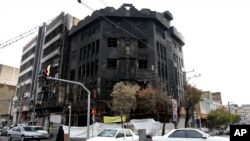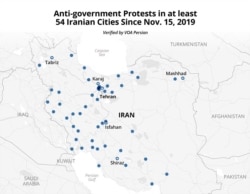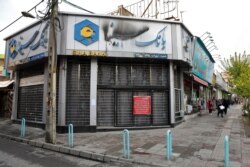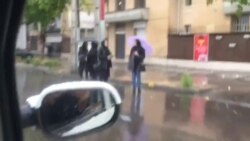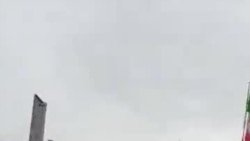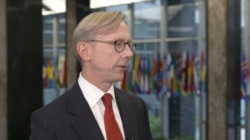Iran's shutdown of domestic Internet access as part of a crackdown on anti-government protests has stretched beyond four days, an unprecedented outage that has caused growing harm to the economy.
London-based Internet monitoring group NetBlocks posted a tweet early Thursday in Iran, saying the "near-total" Internet shutdown had surpassed 100 hours since it began late Saturday.
"Digital rights are human rights: access must be restored to all Iranians," the group added.
Iranian authorities imposed the shutdown to stop opposition activists from communicating and posting online images of nationwide protests that erupted last Friday in response to the government's abrupt 50% increase in the subsidized price of gasoline. The protests had spread to more than 50 urban centers in Iran by Saturday, according to images received from Iran and verified by VOA Persian.
Many Iranians see the gas price increase as putting a further burden on their wallets at a time of worsening economic conditions. Iran's currency has slumped versus the dollar, while inflation and unemployment have soared in the past year, as the U.S. has tightened economic sanctions aimed at pressuring Tehran to stop perceived malign behaviors. Government corruption and mismanagement also have contributed to the malaise.
"Mismanagement by the Iranian regime is helping to make the U.S. sanctions more effective," Ilan Berman, a Middle East security analyst at the American Foreign Policy Council, said in a VOA Persian interview.
"Iranians are angry at the regime for the way it is conducting political and economic business. There is much less anger directed at the United States. Iranians know who the real culprit is," he said.
State-approved Iranian news sites published several articles on Wednesday, highlighting ways in which the internet shutdown has been hurting the economy even more.
Economics news site Eqtesad quoted Communications Minister Mohammad-Javad Azari-Jahromi as saying online business transactions "have fallen by 90%" since the outage began.
Conservative news agency ILNA cited Tehran Chamber of Commerce member Ali Kolahi as saying the shutdown "presents us with problems in exports. We have no idea where our shipments are."
Kolahi added that if the internet is restored "in the next couple of days, it may be possible to reverse some of the damage to our international image, but if this situation continues, it will be too late."
The internet outage also has caused losses in the Iranian stock market, according to pro-government news site Bahar News in a report citing Investors Guild secretary Said Elsami.
Another article by the ISNA news agency quoted Abolfazl Hoseyn-Beygi, a member of Iran's Supreme National Security Council (SNSC), as saying: "With the arrest of the main elements [activists] of the protests, the internet will be reconnected in the coming days."
Iranian President Hassan Rouhani told a Wednesday Cabinet meeting that his government has achieved "victory" over Iran's foreign "enemies" by suppressing the protests. State media have reported the arrests of at least 1,000 people whom authorities accused of engaging in violent confrontations with security personnel, damaging businesses and looting.
WATCH: Aftermath of protests in Shiraz, Iran, Nov. 20, 2019
Some of the damage from the unrest could be seen in a video from the south-central city of Shiraz, filmed on Wednesday and sent to VOA Persian. Branches of multiple banks had their windows smashed. It was not clear who was responsible.
Many of the protests seen in videos from the first few days of the unrest were peaceful.
The ongoing internet shutdown made it difficult to verify whether the protests have ended.
WATCH: Heavy police deployment in Tehran, Nov. 20, 2019
In Tehran, there was a heavy security presence in the streets on Wednesday, as could be seen in another video received by VOA Persian.
Iran's government has not released figures on the numbers of people killed and wounded in the protests, besides saying several security personnel were among the dead. Authorities held a funeral for one of them, an Islamic Revolutionary Guard Corps member, on Wednesday in the town of Shahriar in Tehran province.
Mourners could be seen walking past burned-out buildings that had been damaged in the protests. They chanted slogans against the United States, one of the foreign "enemies" whom Iran's Islamist rulers often have blamed for their domestic problems.
British rights group Amnesty International said it received information indicating Iranian security forces had killed at least 106 protesters by Tuesday. The group said it based the figure on eyewitness accounts, social media videos and reports of exiled Iranian human rights activists.
On Wednesday, Iran's mission to the United Nations dismissed reports of more than 100 fatalities in the unrest as "baseless."
VOA Persian has independently confirmed the killings of at least seven protesters in shootings by Iranian security forces on Saturday.
The killings of protesters have drawn statements of concern from the United States, the U.N. human rights agency OHCHR and France.
U.S. Special Representative for Iran Brian Hook, speaking to VOA Persian on Monday, said the Trump administration has been trying to help Iran's people to circumvent the internet shutdown, without elaborating.
Hook also called on social media companies to suspend the accounts of Iranian Supreme Leader Ayatollah Ali Khamenei, President Rouhani and Foreign Minister Mohamad Javad Zarif until they turn the internet back on. All three have accounts with U.S. social media companies Twitter and Instagram.
Instagram spokesperson Stephanie Otway declined to comment on Hook's appeal when contacted by VOA Persian.
Katie Rosborough, a Twitter spokesperson, also declined a direct response to a VOA Persian query on the issue. Instead, she pointed to a company statement published last month, saying Twitter will take action against accounts of world leaders only if they use the platform to promote violence or post other content deemed harmful to others.
This article originated in VOA's Persian service. Gabriele Barbati contributed to this report.




